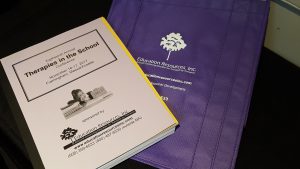2019 is going to be great!

We are currently confirming dates for a great line up of courses coming in 2019. Whether you are looking for a continuing education course focusing on Pediatrics, Geriatrics, Neurology, School Based Therapies, EI, Vestibular Rehab. and Concussion, Acute Care, Feeding, or for courses for the therapist working in the NICU, SNF, LTC or in the Home, we continue to strive to be your preferred provider.
Check our website – courses are now being added for 2019!
Look for new courses presented by new dynamic members of our faculty, who are joining us for 2019:
Therapeutic Management of the Complex Neonate: Cardiac, Respiratory, Neurologic Challenges in the NICU, PICU, SICU and EI Settings
Louisa Ferrera
Rehabilitative Management of Patients with Neurodegenerative Conditions
Robert Hand
Post-Acute Rehabilitation of the Complex Elderly Patient
Robyn Ligotti
TBI: Tools and Strategies to Promote Recovery for the Moderately-Severely Challenged
Speaker TBD
Improving Functional Performance for the Medically Complex Patient
Pat Tino
Integrating NDT, SI and Motor Learning Perspectives in Pediatrics
Kim Westhoff
Pediatric Therapeutic Interventions in Acute Care
Siobhan O’Donnell
NEW – DECEMBER 2018
Self-regulation and Executive Function
Jocelyn Wallach
Course outlines, speaker bios and venues will be announced very shortly!
We listened, and are presenting you with courses that meet your needs. We will continue to add more new speakers and new courses throughout the year…….. Let us know if there is someone you would like to hear speak, or point out what topics will meet your needs.
info@educationresourcesinc.com
To be the first to know about these exciting new courses, please make sure to sign up and join our mailing/email list:


 Renowned faculty member; Jeff Walter, PT, DPT, NCS, has been teaching with ERI since 2005. He is the Director of the Otolaryngology Vestibular and Balance Center at Geisinger Medical Center in Danville, PA and an associate faculty member at Misericordia University, Department of Physical Therapy. Jeff has lectured at professional conferences, universities and continuing education courses for audiologists, physicians and therapists involved in managing patients with dizziness and imbalance. Jeff has developed a teaching website designed to provide information to assist clinicians in the management of dizziness and imbalance.
Renowned faculty member; Jeff Walter, PT, DPT, NCS, has been teaching with ERI since 2005. He is the Director of the Otolaryngology Vestibular and Balance Center at Geisinger Medical Center in Danville, PA and an associate faculty member at Misericordia University, Department of Physical Therapy. Jeff has lectured at professional conferences, universities and continuing education courses for audiologists, physicians and therapists involved in managing patients with dizziness and imbalance. Jeff has developed a teaching website designed to provide information to assist clinicians in the management of dizziness and imbalance.